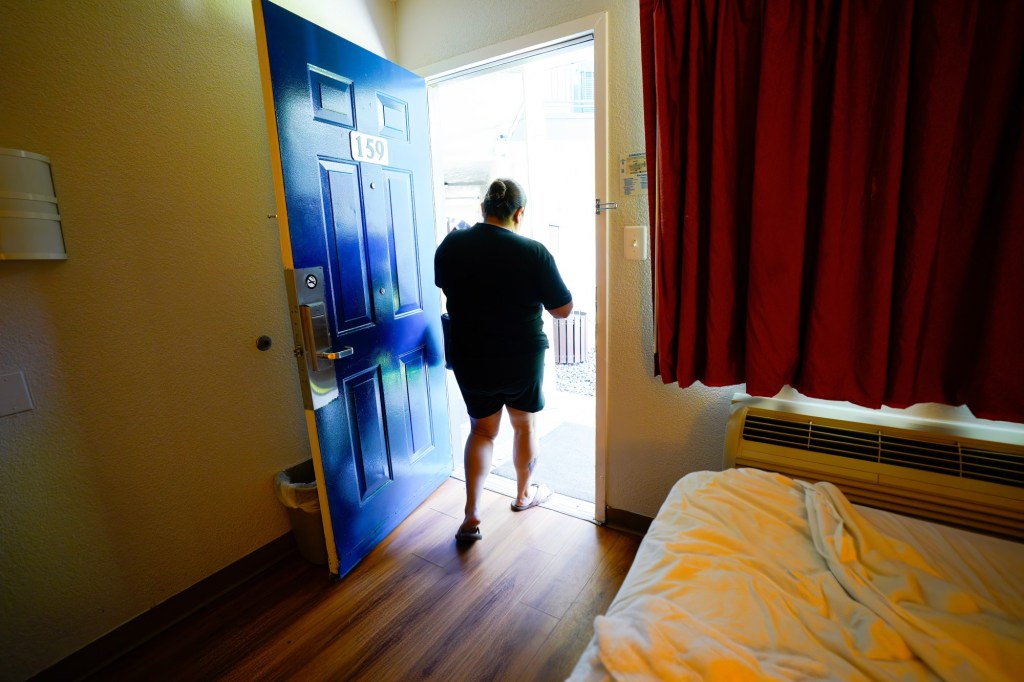After catastrophic flooding forced thousands of San Diegans from their homes early last year, the County of San Diego ran a temporary lodging program to put up many of them in local hotels — a stopgap to buy them time until they could rebuild or find permanent housing.
But residents and advocates soon raised concerns over the temporary lodging program and how it was managed by a county contractor, Equus Workforce Solutions. In response, Supervisor Monica Montgomery Steppe last fall called for an audit to determine if public money was spent properly and if improvements needed to be made.
Now, nearly nine months later — after after monthslong delays — the county has released its findings.
Despite the complaints from flood victims that prompted it, the audit found that Equus’ management of the program was overall sufficient and identified only a few areas where the county needed to improve.
Equus is a longtime contractor with the county, and previously ran a similar program for homeless people and a COVID-19 shelter program.
The audit, finalized last month but released only weeks later on Thursday, July 10, found shortcomings in the company’s communication with residents and highlighted what it called two “questionable” invoices Equus submitted to the county.
But the audit, addressed to the county’s Office of Emergency Services, largely focused on how the county could improve its own systems and what it demands of contractors.
It issued two recommendations: to create requirements in future contracts for handling program participant complaints, and to develop new requests for proposals for emergency services to spur competition for county contracts among more companies.
Those improvements would “better prepare the county for future emergency situations if the county chooses to again provide temporary non-congregate lodging,” the audit found. “Both Equus and the county had a steep learning curve navigating the program’s complexity and scope during its rapid two-week development and launch.”
For Montgomery Steppe, the findings showed that the county needs a more coordinated approach to emergency response — but the audit didn’t examine everything she hoped it would.
“The audit of the Equus contract wasn’t as thorough as we had hoped, which is not entirely surprising because internal audits can often miss the full picture,” Montgomery Steppe said in a statement.
But she added that it revealed “clear and serious failures on the part of Equus.”
After Montgomery Steppe called for the audit in October, the county auditor was supposed to report back to supervisors within four months. But a February update said scheduling challenges had delayed the audit’s fieldwork.
County spokesperson Tammy Glenn said in April that the fieldwork was finished by the end of February and the audit was expected to be released in early May. But in late May, she said the audit would be delayed again, and “additional information is being incorporated to ensure accuracy and clarity.”
Glenn said at the time that she didn’t have further information about what details were being incorporated.
 Jerry Hernandez waited in the lobby of the Ramada in National City where he was living after his home in Southcrest flooded in January 2024. (Nelvin C. Cepeda / The San Diego Union-Tribune)
Jerry Hernandez waited in the lobby of the Ramada in National City where he was living after his home in Southcrest flooded in January 2024. (Nelvin C. Cepeda / The San Diego Union-Tribune)
More than 860 households got temporary lodging under the program during its run from Feb. 12 through June 21 of last year. Participants were housed for a total of more than 88,000 hotel night stays, according to the audit.
But displaced residents who participated cited a litany of problems with it, including disorganization, poor communication and worries over the security of their personal information.
“There’s confusion; there’s doubt,” one participant told The San Diego Union-Tribune at the time. “It’s kind of up in the air most of the time, because we’re not sure what the next step is.”
There wasn’t a “robust” procedure for Equus to respond to residents’ complaints, according to the audit. While auditors identified 34 complaints made by people in the lodging program, only 18 of those — just over half — had documented resolutions.
But the audit says this wasn’t the product of Equus’ failures, instead blaming the contract language itself.
“The contract’s limited requirement for policies and procedures regarding complaints, withoutexplicitly mandating a process to ensure complaint resolution, led to significant issues in trackingand resolving participant grievances,” the audit read.
The audit also found that the company’s method of communicating with flood victims — including repeatedly asking them for the same information — complied with the county’s contract, even though it may have left people confused and worried about how Equus was collecting and storing their personal information.
Equus did not respond to a request for comment on the audit’s findings.
The county said that it sent Equus a copy of the audit to review prior to publication and provided a copy of the report upon publication.
But it did not ask Equus for a formal response, since the audit found Equus had complied with its contract.
Last March, however, the company’s then-CEO Mark Douglass apologized to county supervisors and vowed to do a better job of supporting flood victims.
The audit also noted two discrepancies over Equus’ invoices for payment to the county.
According to the audit, as of Feb. 28, Equus had invoiced the county for about $21 million in services for the temporary lodging program, and the county had paid Equus about $16.5 million.
The audit highlighted two instances of “questionable” charges from Equus to the county — including one bill to pay temporary staff that exceeded the rates outlined in staffing agreements by close to $2 million.
“The county would have paid twice for the temporary staff’s taxes, benefits and administrative costs,” the audit found.
The audit also noted that Equus invoiced the county for more than $380,000 in labor charges from September 2024 through January of this year, despite the fact that the lodging program ended last June.
The county hasn’t paid either of those invoices, according to the audit, and Glenn said it is still coordinating with Equus to pay outstanding bills and clarify any charges in question.
“The audit found Equus was in compliance with the contract provisions aside from the outstanding invoice issue but also noted that improvements need to be made to better prepare the county for future emergency situations,” she said in an email.
In the county’s June 20 response to the audit’s recommendations, acting emergency services director Julie E. Jeakle said her department and the county’s contracting department would incorporate “enhanced complaint management requirements” into new countywide emergency temporary lodging contracts.
This would include a comprehensive complaint resolution process, a system to track complaints and a requirement that complaints not be closed until they’ve been resolved.
The Office of Emergency Services also agreed with the audit’s recommendation to spur competition for county contracts, since Equus was the only viable contractor that applied to manage the lodging program.
Jeakle said the agency intends to separate key services in the case of a future emergency event — one of the “lessons learned” from last year’s event, she said in her written response to auditors.
Instead of relying on one provider to offer wraparound services, such as lodging, transportation and food, it would instead contract with multiple providers.
The Office of Emergency Services is required to provide the county’s Office of Audits & Advisory Services with quarterly reports on its progress in responding to the audit’s recommendations. It says it aims to establish by December a target date for implementing the recommendations.
Originally Published: July 17, 2025 at 5:00 AM PDT
